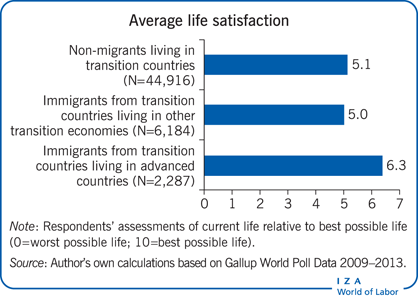Elevator pitch
Most comparative research suggests that immigrants from post-socialist countries earn less than natives, work in jobs for which they are overqualified, and may experience unhappiness compared with natives, other immigrants, and non-migrants. In contrast, one study presents causal evidence which shows that moving from transition economies to live in the West increases the incomes, life satisfaction, and freedom perceptions of those who move. Credibly assessing whether leaving transition economies improves movers’ quality of life remains a challenging empirical question.

Key findings
Pros
Post-socialist immigrants who are happy and productive abroad positively contribute to their home and destination countries.
Temporary migrants from “Eastern Partnership” countries investing in their skills before moving can increase their earnings upon return and constitute a “brain gain” for the sending countries.
One study shows a positive causal effect of migration on the well-being of those who leave transition economies to work and live in the West.
Cons
Few studies credibly assess the well-being consequences of leaving transition economies, and the evidence focuses mainly on experiences in the West.
Post-socialist immigrants earn less than natives in Europe, though the earnings gap could decrease over time.
Post-socialist immigrants often experience occupational downgrading or “skill waste” in the destination countries.
Migrant happiness in the destination countries may decline over time due to rising aspirations or adaptation, or if migrants compare themselves to high-earning natives.